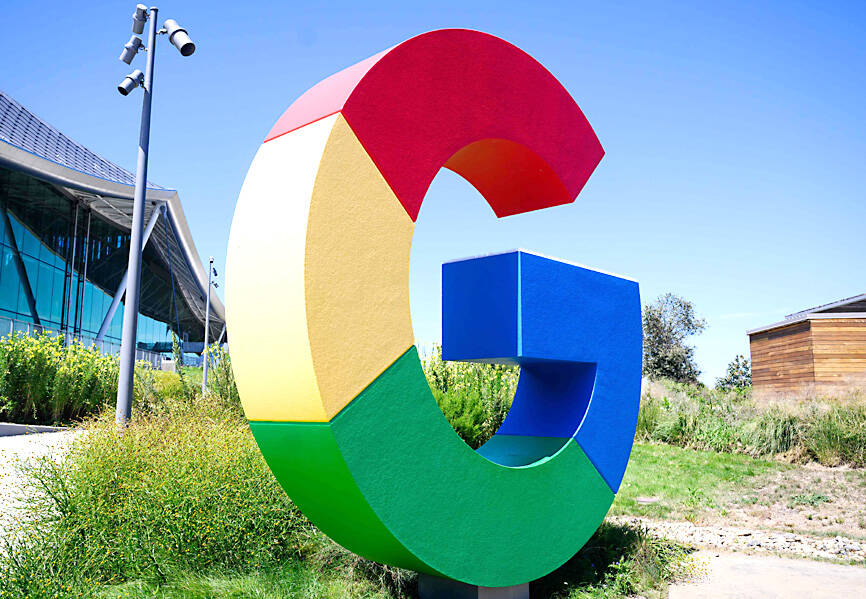Alphabet Inc’s Google must sell its Chrome browser, share data and search results with rivals, and take other measures — including possibly selling Android — to end its monopoly on online search, prosecutors argued in a US court on Wednesday.
Such changes could result in Google being regulated for as many as 10 years via a committee appointed by the Washington federal court that ruled it held an illegal monopoly in search and related advertising in the US.
The measures presented by the US Department of Justice (DOJ) are part of a landmark case which has the potential to reshape how users find information. In the US, Google processes 90 percent of searches.

Photo: Josh Edelson / AFP
“Google’s unlawful behavior has deprived rivals not only of critical distribution channels but also distribution partners who could otherwise enable entry into these markets by competitors in new and innovative ways,” the DOJ and state antitrust enforcers said in a court filing on Wednesday.
Their proposals include ending exclusive agreements in which Google pays billions of dollars annually to Apple Inc and other device vendors to make its search engine the default on their tablets and smartphones.
The filing expands on an earlier outline on how the government wants to end Google’s monopoly in the US. Google called the proposals radical at the time, saying they would harm US consumers and businesses and shake US competitiveness in artificial intelligence.
US District Judge Amit Mehta has scheduled a trial on the proposals for April, though US president-elect Donald Trump and the DOJ’s next antitrust head could step in and change course in the case.
The proposals are wide-ranging, including barring Google from re-entering the browser market for five years and insisting Google sell its Android mobile operating system if other remedies fail to restore competition. The DOJ has also requested a prohibition on Google buying or investing in search rivals, query-based artificial intelligence products or advertising technology.
A five-person technical committee appointed by the judge would enforce compliance under prosecutors’ proposals. The committee, which Google would pay for, would have the power to demand documents, interview employees and delve into software code, the filing showed.
The measures together are meant to break “a perpetual feedback loop that further entrenches Google” through additional users, data and advertising dollars, prosecutors said.
Google would have a chance to present its own proposals next month.
Prosecutors crafted the proposals after speaking with companies that compete with Google, including search engine DuckDuckGo.
“We think this is a really big deal and will lower the barriers to competition,” DuckDuckGo’s head of public affairs Kamyl Bazbaz said.
DuckDuckGo has accused Google of trying to dodge European Union rules requiring data sharing. Google said it would not compromise user trust by giving competitors sensitive data.

Sweeping policy changes under US Secretary of Health and Human Services Robert F. Kennedy Jr are having a chilling effect on vaccine makers as anti-vaccine rhetoric has turned into concrete changes in inoculation schedules and recommendations, investors and executives said. The administration of US President Donald Trump has in the past year upended vaccine recommendations, with the country last month ending its longstanding guidance that all children receive inoculations against flu, hepatitis A and other diseases. The unprecedented changes have led to diminished vaccine usage, hurt the investment case for some biotechs, and created a drag that would likely dent revenues and

Global semiconductor stocks advanced yesterday, as comments by Nvidia Corp chief executive officer Jensen Huang (黃仁勳) at Davos, Switzerland, helped reinforce investor enthusiasm for artificial intelligence (AI). Samsung Electronics Co gained as much as 5 percent to an all-time high, helping drive South Korea’s benchmark KOSPI above 5,000 for the first time. That came after the Philadelphia Semiconductor Index rose more than 3 percent to a fresh record on Wednesday, with a boost from Nvidia. The gains came amid broad risk-on trade after US President Donald Trump withdrew his threat of tariffs on some European nations over backing for Greenland. Huang further

Nvidia Corp’s GB300 platform is expected to account for 70 to 80 percent of global artificial intelligence (AI) server rack shipments this year, while adoption of its next-generation Vera Rubin 200 platform is to gradually gain momentum after the third quarter of the year, TrendForce Corp (集邦科技) said. Servers based on Nvidia’s GB300 chips entered mass production last quarter and they are expected to become the mainstay models for Taiwanese server manufacturers this year, Trendforce analyst Frank Kung (龔明德) said in an interview. This year is expected to be a breakout year for AI servers based on a variety of chips, as

HSBC Bank Taiwan Ltd (匯豐台灣商銀) and the Taiwan High Prosecutors Office recently signed a memorandum of understanding (MOU) to enhance cooperation on the suspicious transaction analysis mechanism. This landmark agreement makes HSBC the first foreign bank in Taiwan to establish such a partnership with the High Prosecutors Office, underscoring its commitment to active anti-fraud initiatives, financial inclusion, and the “Treating Customers Fairly” principle. Through this deep public-private collaboration, both parties aim to co-create a secure financial ecosystem via early warning detection and precise fraud prevention technologies. At the signing ceremony, HSBC Taiwan CEO and head of banking Adam Chen (陳志堅)